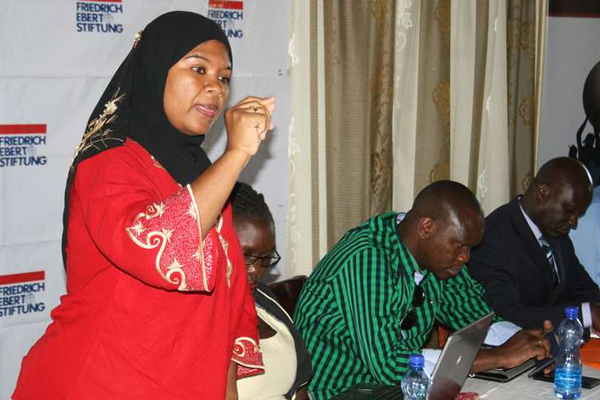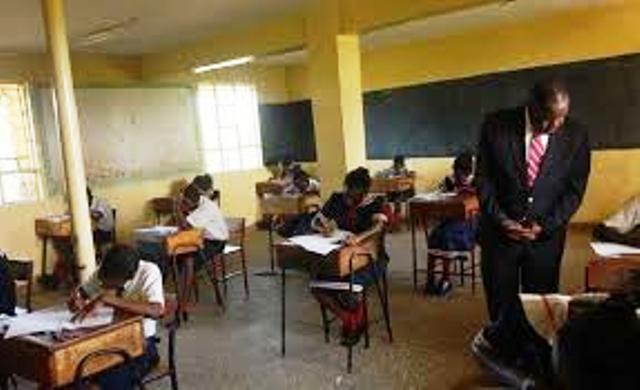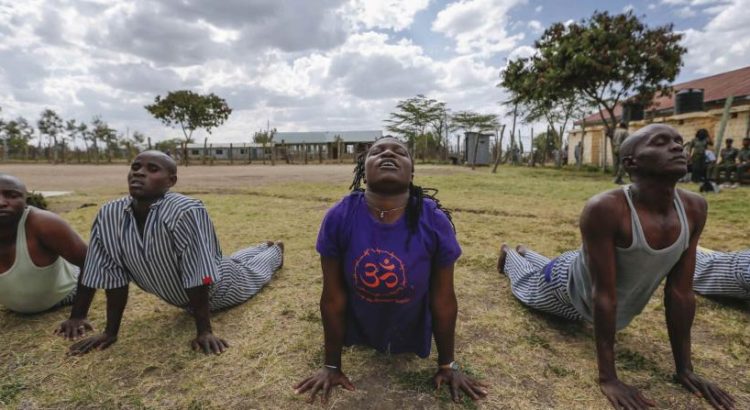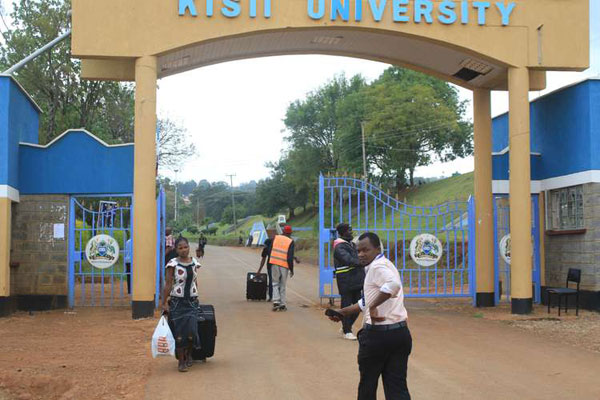África/Kenia/Noviembre 2016/
The Teachers Service Commission has interdicted seven staff members over malpractices in last week’s Standard Eight examinations.
In a move likely to send a stern warning to people bent on cheating in the Kenya Certificate of Secondary Education examinations that start tomorrow, the Nation has established that TSC Secretary Nancy Macharia ordered the interdictions as part of measures to ensure a flawless examination for the first time in decades.
Some of the teachers affected are from St Andrews Boys Kaggwa Primary School in Nyamira where a headteacher is accused of having used his personal car to transport exams to his school instead of using a bus hired for the purpose.
Later, a candidate was found with two sheets of paper scribbled with answers of the English exam.
On Friday, the teachers were among people charged with three counts of examination malpractices in a Keroka court. They appeared before Keroka Resident Magistrate Njoki Kahara.
Among them was St Andrews Boys Kaggwa Primary School headteacher, examination supervisor and invigilators.
The headteacher, supervisor and invigilators faced separate charges of aiding and abetting a candidate to copy an English language paper.
They denied the charges and were released on a bond of Sh300,000 with a similar surety each and a cash bail of Sh100,000.
The case will be mentioned on November 17, 2016 and heard on April 3, 2017.
IN RONGAI
In Nakuru, three teachers have been interdicted at Njoro Precious School in Rongai, after a deputy headteacher was found in class with an invigilator while exams were going on.
«Upon inquiry by the head- teacher, the deputy disappeared and the headteacher refused to give particulars of the deputy head,» says the Profiling Report on Teachers Involved in the Cheating of KCPE.
In a bizarre incident at Kaplenge Primary School, Moiben, in Marakwet, a supervisor has been suspended after an unknown person gained entry into the school office where the answer sweets for Kiswahili Lugha were unguarded as officials were having lunch.
«On returning, the officials noticed that the sealed envelope had been moved and the seal tampered with, albeit minimally,» the report adds.
In all, 11 centres were affected by the small hitches, which the examination authorities said must end as KCSE begins.
According to the report, many of the micro-incidents of cheating in last week’s 10 centres happened in private schools.
They included opening some exam bags a few minutes before the scheduled time.
In a school in Wajir, 11 mobile phones were found in an examination room immediately before the social studies and religious education paper.
On Saturday, Education Cabinet Secretary Fred Matiang’i said the ministry’s move to punish those who commit even the «smallest of mistakes» was a clear testimony that «we are keen to deliver a credible examination free from cheating».
‘ARE HAPPY’
«We are happy that not a single KCPE question was leaked this year contrary to what we have witnessed in the past,» Dr Matiang’i said.
Agencies of government, he said, were able to act decisively and firmly to stop attempts to give unfair advantage to some candidates.
Ahead of last week, Dr Matiang’i, TSC and Kenya National Examinations Council (Knec) bosses met and adopted a joint strategy to monitor and supervise the exams countrywide. The ministry worked closely with Interior and Coordination of National Government and Information Communications and Technology ministries.
On the first day, Tuesday, Dr Matiang’i supervised examinations in Vihiga and Kisumu counties while Mrs Macharia monitored the exercise in Uasin Gishu.
Principal Secretary Belio Kipsang supervised Kilifi while Knec chairman Prof George Magoha was in Mombasa County.
Activity at Nairobi’s Jogoo House, the Education ministry’s headquarters, was reduced to a bare minimum as all directors and their deputies were dispatched to various counties.
So successful was the strategy that anomalies were detected by the minute and relayed to the Knec Command and Control Centre that has been set up at Caledonia House.
Investigations by the Nation established that the officers who are monitoring the examinations had set up a joint WhatsApp group through which they were able to coordinate the exercise, with Dr Matiang’i issuing directives whenever urgent action was needed.
A MEETING
It is understood that Dr Matiang’i, Prof Magoha and Mrs Macharia held a meeting at Jogoo House on Friday evening and finalised a more elaborate plan to monitor the KCSE which will last nearly a month.
The officials are said to have compiled a schedule and mapping of the whole country, showing how various agencies of government will coordinate to execute the exercise.
Administration of the exams this year has taken a multisectoral approach involving the ministries of Education, Interior and Coordination of National Government and Information Communications and Technology in a bid to ensure they are not leaked.
Under the arrangement, all teachers except those involved in the administration of practical subjects and boarding facilities, have been directed to keep off schools during the examination season starting from November 1 to November 30, 2016.
The Knec has banned the use of clipboards and geometrical sets from examination rooms. Candidates will be required to carry their geometrical instruments and writing materials in a clear see-through porch/poly bag/plastic paper.
Also banned is the use of mathematical tables and calculators during examination papers for which they are not required. Use of mobile phones within the precincts of the examination centres has been banned for all those involved in the exercise.
Fuente:
http://allafrica.com/view/group/main/main/id/00047032.html
Fuente imagen:
https://lh3.googleusercontent.com/qv6_-oWmFyD-F5LrJWbY_yw5-IvDDH0TrV2v8kX1T39v0s1Nq4Sm7DBHihHxNlDXa12VA4g=s139














 Users Today : 0
Users Today : 0 Total Users : 35404267
Total Users : 35404267 Views Today :
Views Today :  Total views : 3333774
Total views : 3333774